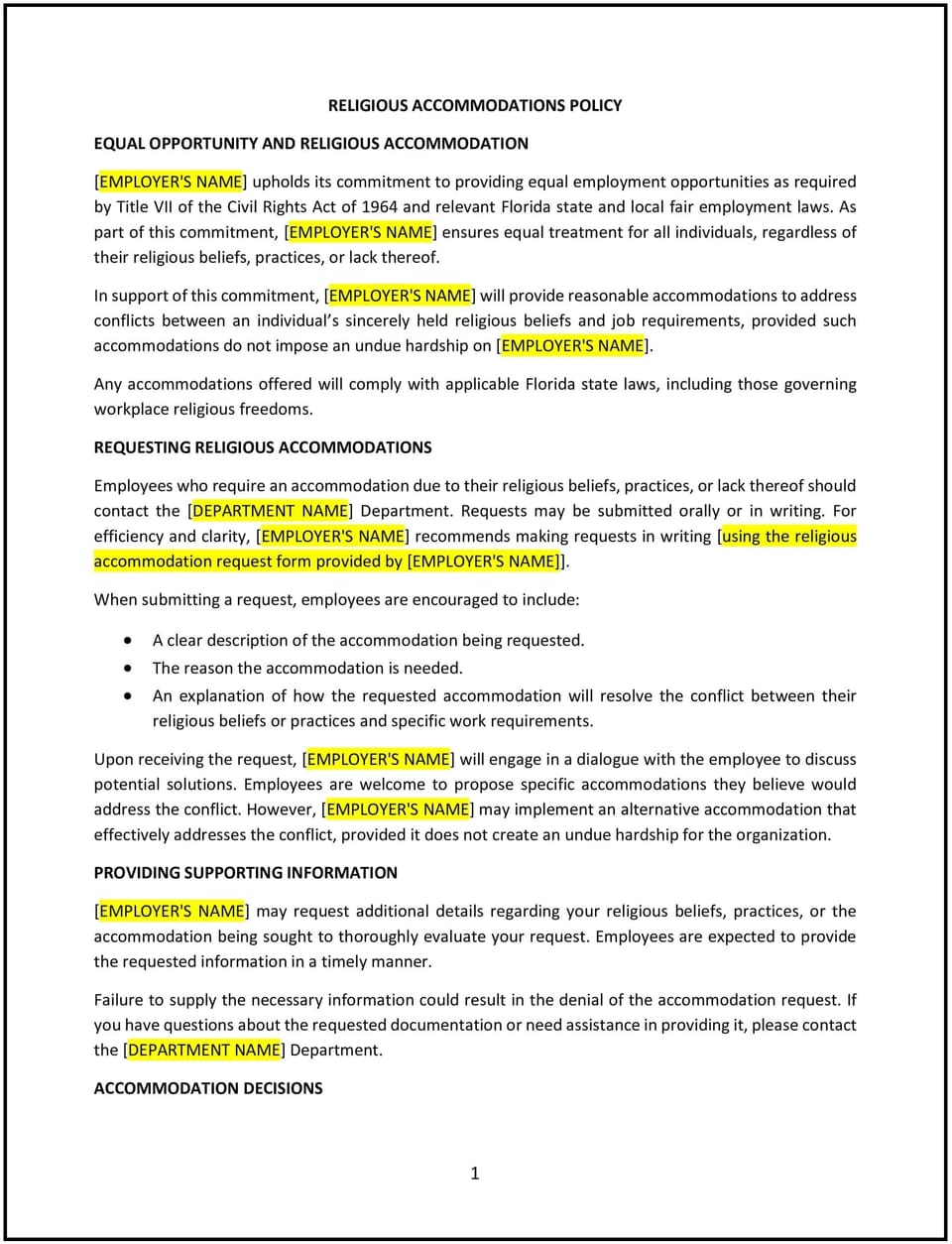Religious accommodations policy (Florida): Free template

Religious accommodations policy (Florida)
A religious accommodations policy helps Florida businesses establish guidelines for supporting employees who have religious beliefs and practices. This policy outlines procedures for requesting, evaluating, and implementing accommodations to ensure that employees can observe their religious practices without undue hardship. It is designed to promote inclusivity, reduce barriers, and provide clear expectations for managing religious accommodations in the workplace.
By implementing this policy, businesses in Florida can demonstrate their commitment to inclusivity, enhance employee satisfaction, and align with the state’s focus on diversity and mutual respect.
How to use this religious accommodations policy (Florida)
- Define eligible requests: Clearly specify what constitutes a request for religious accommodation, such as time off for religious observances, dress code modifications, or prayer breaks.
- Establish request procedures: Outline how employees should submit accommodation requests, including whom to contact and how to document requests.
- Address evaluation criteria: Explain how businesses should assess requests based on factors such as job requirements, feasibility, and operational impact.
- Provide support resources: Offer information about employee assistance programs (EAPs) or local resources for support.
- Communicate the policy: Share the policy with employees during onboarding and through regular communications to ensure awareness and understanding.
- Monitor adherence: Regularly review how the policy is applied and address any concerns or discrepancies promptly.
- Update the policy: Periodically assess the policy to reflect changes in workplace dynamics, legal standards, or business needs.
Benefits of using this religious accommodations policy (Florida)
This policy offers several advantages for Florida businesses:
- Promotes inclusivity: Supporting religious accommodations fosters a diverse and welcoming workplace culture.
- Reduces barriers: Providing accommodations helps employees observe their religious practices without undue hardship.
- Builds trust: A clear policy demonstrates the business’s commitment to fairness and respect for all employees.
- Aligns with community values: Reflects Florida’s emphasis on diversity, mutual respect, and creating equitable workplaces.
- Enhances reputation: Demonstrates the business’s dedication to ethical practices and employee well-being.
- Improves retention: Offering accommodations contributes to higher employee satisfaction and loyalty.
- Supports growth: A robust policy helps businesses attract and retain talent from diverse backgrounds.
Tips for using this religious accommodations policy (Florida)
- Communicate clearly: Ensure employees understand the policy by providing written materials and discussing it during meetings or training sessions.
- Train managers: Educate supervisors on how to handle accommodation requests sensitively and consistently.
- Be flexible: Allow for reasonable adjustments based on individual needs and job requirements to ensure effectiveness.
- Track requests: Maintain records of accommodation requests and approvals to monitor trends and ensure fairness.
- Stay informed: Keep up with changes in societal norms, workplace expectations, or state-specific guidelines that may affect accommodations.
- Encourage feedback: Solicit input from employees to identify areas for improvement and ensure the policy meets their needs.
- Review periodically: Assess the policy’s effectiveness and make updates as needed to reflect changes in workplace dynamics or business goals.
Q: Why should Florida businesses adopt a religious accommodations policy?
A: Businesses should adopt this policy to promote inclusivity, reduce barriers, and demonstrate their commitment to supporting employees’ religious practices.
Q: What types of accommodations should businesses consider?
A: Businesses should consider accommodations such as time off for religious observances, dress code modifications, prayer breaks, or flexible work schedules based on individual needs.
Q: How should businesses evaluate accommodation requests?
A: Businesses should assess requests based on job requirements, feasibility, and operational impact, consulting with the employee and relevant experts if necessary.
Q: What documentation should businesses require for accommodation requests?
A: Businesses should request reasonable documentation, such as a statement explaining the religious practice and how the accommodation would help, to verify the need for accommodations.
Q: How should businesses handle requests that are not feasible?
A: Businesses should engage in an interactive process with the employee to explore alternative solutions that meet their needs without compromising operational requirements.
Q: Should businesses provide accommodations for religious holidays?
A: Businesses should consider providing time off for religious holidays, ensuring employees can observe their practices without undue hardship.
Q: How often should businesses review the policy?
A: Businesses should review the policy annually or whenever there are significant changes in workplace dynamics, employee needs, or business operations.
This article contains general legal information and does not contain legal advice. Cobrief is not a law firm or a substitute for an attorney or law firm. The law is complex and changes often. For legal advice, please ask a lawyer.


